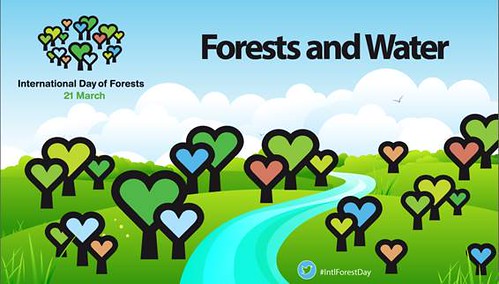School of Forestry and Wildlife Sciences celebrating International Day of Forests; hosting photo contest for Auburn University students
Article body
Auburn University’s School of Forestry and Wildlife Sciences will host an informational program and photo contest to commemorate the United Nations’ global celebration of forests Monday, March 21.
Created to raise awareness of the importance of all types of forests and of trees outside forests, the annual International Day of Forests provides a platform to communicate the vital role forests play in poverty eradication, environmental sustainability and food security.
The School of Forestry and Wildlife Sciences will mark the occasion with an exhibition, “Forests and Water,” highlighting how forests are vital to the supply of freshwater essential for people’s life. It will be held in the school’s atrium March 21 from 11 a.m.-12 p.m.
"Many people are aware of the issues concerning global deforestation, but may not understand the influence of forests on the quality and availability of fresh water. This occasion provides an opportunity for the School of Forestry and Wildlife Sciences to engage our community on this important function of our forests," Dean Janaki Alavalapati said.
The school will also host a photo contest for Auburn University students, who are invited to share their photos of forests and tree-planting initiatives showing the world how trees, forests and their surrounding environments make a difference to communities. A panel will judge each photo based on its essence and merit, and the best photo will be recognized on April 4. Participants may submit their photos from March 21-28. Contest rules are available at http://wp.auburn.edu/sfws/4381-2/.
Forests cover one third of global land surface, providing key ecosystem goods and services including water, food and energy around the world. Forests are the most biologically-diverse ecosystems that provide home to more than 80 percent of the terrestrial species of animals, plants and insects. Similarly, around 1.6 billion people depend on forests, directly or indirectly, for their livelihood.
Although forests provide numerous societal, ecological, economic and health benefits, deforestation and forest degradation continue at an alarming rate, accounting for 12 to 20 percent of global greenhouse gas emissions.
Sustainable management of all types of forests are at the heart of unlocking challenges for the benefit of current and future generations, noted United Nations officials.
Key facts related to forests and water:
• 75 percent of the world’s accessible freshwater are supplied by forested watershed and wetlands.
• One third of the world’s largest cities obtain their drinking water from forested areas.
• Forests act as natural water filters by minimizing soil erosion on site, reducing sediment in water bodies and trapping water pollutants in the forest litter.
• Climate change is altering forests’ role in regulating water flows by increasing catastrophes such as floods, droughts and landslides.
For more information about the program and photo contest, contact Shree Dangal at szs0091@auburn.edu or call (814) 880-5566.
Related Media
Media interested in this story can contact Communications Director Preston Sparks at (334) 844-9999 or preston.sparks@auburn.edu.
Auburn University is a nationally ranked land grant institution recognized for its commitment to world-class scholarship, interdisciplinary research with an elite, top-tier Carnegie R1 classification, life-changing outreach with Carnegie’s Community Engagement designation and an undergraduate education experience second to none. Auburn is home to more than 30,000 students, and its faculty and research partners collaborate to develop and deliver meaningful scholarship, science and technology-based advancements that meet pressing regional, national and global needs. Auburn’s commitment to active student engagement, professional success and public/private partnership drives a growing reputation for outreach and extension that delivers broad economic, health and societal impact.





